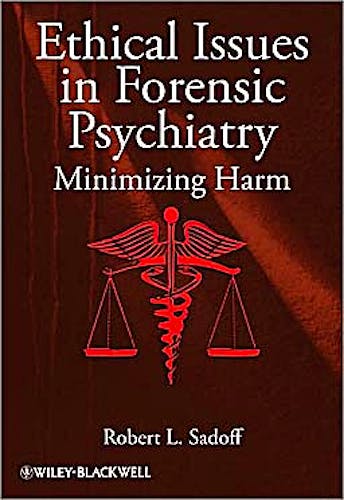

No hay productos en el carrito



Ethical Issues in Forensic Psychiatry. Minimizing Harm
Sadoff, R.
1ª Edición Diciembre 2010
Inglés
Tapa dura
256 pags
1000 gr
null x null x null cm
ISBN 9780470670132
Editorial WILEY
LIBRO IMPRESO
-5%
78,30 €74,38 €IVA incluido
75,29 €71,52 €IVA no incluido
Recíbelo en un plazo de
2 - 3 semanas
LIBRO ELECTRÓNICO
-5%
67,59 €64,21 €IVA incluido
64,99 €61,74 €IVA no incluido
Acceso On Line
Inmediato
Description
Ethical medical practice and treatment in psychiatry are based on the concept
of first do no harm. However, this cannot, and does not, apply to forensic cases
where there is no doctor–patient relationship and the forensic psychiatrist
may indeed cause harm to the examinee. In this book, Robert Sadoff analyzes
the ethical issues affecting forensic psychiatric practice, especially those
promulgated by the American Academy of Psychiatry and the Law. Within those
guidelines, he looks at individual bias, vulnerability of the examinee, and
potential harm to the mental health professional. The book discusses each of
the procedures of the forensic expert separately with respect to minimizing
harm. It has been written with an international audience in mind and features
chapters reviewing the European and UK perspectives, by Emanuele Valenti and
John Baird, respectively.
Robert Sadoff addresses the long-term harm that can be either avoided or minimized
through careful planning and application of ethical principles. He is not advocating
that the harm can be totally eliminated, because that is impossible in the adversarial
system in which forensic psychiatrists work. However, there are means by which
harm may be minimized if care is taken during the assessment, the report writing,
and the testimony phase of the proceedings. The book develops the scope of forensic
psychiatry from the standpoint of administrative, civil and criminal cases.
It presents the practical issues involved in conducting forensic psychiatric
assessments under various conditions plus special considerations, such as bias,
minimizing harm, developing a therapeutic approach, and elaborating on various
vulnerable individuals who are frequently examined in forensic cases. These
include juveniles, mentally retarded, autistic, sexual assault victims, the
elderly, the organically damaged, the psychotic, and mentally disabled prisoners.
Immigrants are covered in a chapter by Solange Margery Bertoglia. The ethical
issues in conducting forensic psychiatric examinations and presenting psychiatric
testimony in court are examined and discussed. Cases illustrating the difficulties
involved punctuate the presentation. The book closes with a fascinating account
of the legal perspective by Donna Vanderpool.
In summary, this book illustrates the ethical and practical issues that affect forensic psychiatric practice. The question is not what we do, but how we do it, and which standards, ethical guidelines and personal values contribute to the total picture. Despite the fact that we cannot always adhere to the doctrine of “primum non nocere,” we can minimize the harm caused inherently by the adversarial system in which we participate.
Praise for 'Ethical Issues in Forensic Psychiatry'
"One of the founding giants of the forensic psychiatric field has written here far more than a “mere” ethics textbook. Instead, this compendium serves multiple purposes: it is a valuable primer on forensic techniques of examination and testimony, a model of best forensic practices, and an instruction on the most appropriately civilized way in which to conduct oneself as a forensic psychiatrist.
The success of these multiple accomplishments clearly derives from characteristics of the author. In both sage advice to practitioners and in many revealing case examples, Dr. Sadoff displays the tact, good manners and sensitivity of a consummate gentleman – a term not always associated with the hurly-burly of courtroom work. The book’s primary focus on avoiding harm to all the parties involved in the work places it on the moral high ground of the legal system in which participating clinicians must find a place."
Thomas G. Gutheil, MD, Professor of Psychiatry and Co-Founder, Program in Psychiatry and the Law, Beth Israel Deaconess Medical Center, Harvard Medical School.
Author Information
Robert L. Sadoff, M.D. is Clinical Professor of Psychiatry and Director of
the Center for Studies in Social-Legal Psychiatry at the University of Pennsylvania
School of Medicine. He is board certified in psychiatry, forensic psychiatry,
and legal medicine, and has added qualifications in forensic psychiatry with
the American Board of Psychiatry and Neurology.
Dr. Sadoff is the author of over 100 articles in medical and legal journals,
more than 30 chapters in other books, and has authored, edited, or coauthored
8 books, including Forensic Psychiatry: A Practical Guide for Lawyers and Psychiatrists,
Psychiatry Malpractice: Cases and Comments for Clinicians and Mental Health
Experts: Roles and Qualifications for Court. Dr. Sadoff has examined over 10,000
individuals charged with crimes during the past 40 years, and has testified
for both the prosecution and defense in criminal cases and for the plaintiff
and defense in civil cases in approximately 20 states and several federal jurisdictions.
Dr. Sadoff is the recipient of numerous awards, including Best Doctors in America, Who’s Who in the World, The Lifetime Achievement Award of the Philadelphia Psychiatric Society, the Nathaniel Winkelman Award, the Manfred Guttmacher Award from the American Psychiatric Association, the Philippe Pinel Award from the International Academy of Law and Mental Health, and the prestigious Isaac Ray Award from the American Psychiatric Association. He has also received the Earl Bond Award from the University of Pennsylvania as the Outstanding Teacher in Psychiatry for 1979, and the Dean’s Award for Outstanding Contributions to Medicine at the University of Pennsylvania Medical School for 2008.
© 2025 Axón Librería S.L.
2.149.0